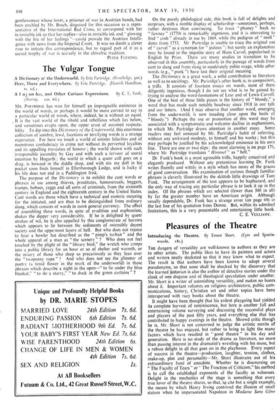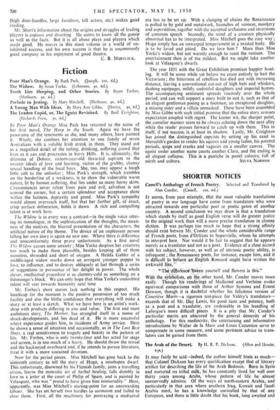Pleasures of the Theatre
THE dangers of versatility are well-known to authors as they are to other artists. The public likes to have its painters and actors and writers neatly docketed so that it may know what to expect. The result is that authors have been known to adopt several pseudonyms, so that none shall be shocked by the discovery that the learned historian is also the author of detective stories under the cloak of one disguise and of theological speculation under another. Mr. Short is a writer of astonishing versatility, and makes no bones about it. Important volumes on religious architecture, public com- munications, history, Christian art and other topics have been interspersed with racy books about the theatre.
It might have been thought that his ardent playgoing had yielded its complete harvest of reminiscence, but here is another full and entertaining volume surveying and discussing the successful plays and players of the past fifty years, and everything else that has contributed to happy evenings in the theatre. Shrewd critic though he is, Mr. Short is not concerned to judge the artistic merits of the theatre he has enjoyed, but rather to bring to light the many factors which have resulted in " good theatre " in his day and generation. Here is no study of the drama as literature, no more than passing interest in the dramatist's wrestling with his muse, but a robust delight in all that goes on in the playhouse. Every aspect of success in the theatre—production, laughter, tension, clothes, make-up, plot and personality—Mr. Short illustrates out of his extraordinary fund of anecdote. Whether he is discoursing on "The Faculty of Tears " or The Function of Criticism," his method is to call the established exponents of the faculty as witnesses. Delight in the mechanics of the stage is something that every true lover of the theatre shares, so that, to cite but a single example, the means by which Henry Irving contrived the illusion of small stature when he impersonated Napoleon in Madame Sans Gene
(high door-handles, large furniture, tall actors, etc.) makes good reading.
Mr. Short's information about the origins and struggles of leading players is copious and diverting. He seems to know all the gossip as well as the facts. But it is all about plays and players which made good: He moves in this stout volume in a world of un- inhibited success, and his own success is that he is uncommonly good company in his enjoyment of good theatre.
C. B. MORTLOCK.











































 Previous page
Previous page